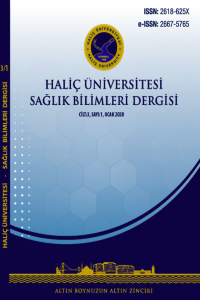Karaman Bölgesinde Yenidoğan İşitme Tarama Testi Sonuçları
Özet Amaç: Bu çalışmada; bölgemizde doğmuş sağlıklı yenidoğanlardaki işitme tarama sonuçları güncel literatür eşliğinde sunulmuştur. Gereç ve Yöntem: Çalışmaya Ocak 2017-Mart 2019 tarihleri arasında bölgemizde doğan matür ve sağlıklı 8003 bebeği dahil ettik. Doğum sonrası ilk 1. haftada geçici uyarılmış otoakustik emisyon ile ilk tarama yapıldı. Daha sonra aynı test ile taramayı geçemeyen hastalara 15 gün sonra 2. tarama yapıldı. Bu taramayı da geçemeyen bebeklere işitsel beyin sapı yanıtı testi uygulandı. Son tarama testi sonrası tek ya da çift taraflı cevap alınamayan bebekler olası işitme kaybı ön tanısıyla bir üst merkeze sevk edildi. Bulgular: Çalışma sonucunda olası işitme kaybı olan bebek sayısı 26 (%0.32) olarak saptandı. Yenidoğanların yarısında (n=13) tek taraflı işitme kaybı diğer yarısında (n=13) ise çift taraflı işitme kaybı olduğu tespit edildi. Sonuç: Tüm yenidoğanlara ilk bir ay içinde işitme tarama testleri yapılmalı ve testi geçemeyenler bir üst merkeze sevk edilmelidir. İşitme kaybı saptanan bebeklerin 6. aydan önce rehabilitasyon programına başlanması sağlanmalıdır. Anahtar Kelimeler: Yenidoğan, işitme taraması, işitme kaybı
Anahtar Kelimeler:
Yenidoğan, işitme taraması
Newborn Hearing Screening Test Results in the Karaman Region
AbstractObjective: In this study, the results of auditory screening tests of healthy newborns in our region are presented in the light of current literature.Materials and Methods: A total of 8003 infants born in our region between January 2017 and March 2019 were included in this study. Initial screening tests were performed in the first postnatal week with temporary evoked otoacoustic emission, which was re-applied 15 days later to patients who did not pass the initial test. If the newborn failed both tests, auditory brainstem response tests were applied for further assessment. After the last screening test, babies who did not have unilateral or bilateral response were referred to a higher healthcare center with a preliminary diagnosis of possible hearing loss.Results: The number of infants with possible hearing loss was 26 (0.32%). Half of these newborns (n = 13) had unilateral hearing loss and the other half (n = 13) had bilateral hearing loss.Conclusion: All newborns should undergo hearing screening tests within the first month and those who fail the test should be referred to a higher healthcare center. Rehabilitation programs should be provided for babies with hearing loss before the 6th month. Keywords: Newborn, auditory screening, hearing loss
Keywords:
Newborn, auditory screening,
___
- KAYNAKLAR1. Vohr B. Overview: Infants and children with hearing loss—part I. Ment Retard Dev Disabil Res Rev. 2003;9(2):62-4.
- 2. Force UPST. Newborn hearing screening: recommendations and rationale. Am J Nurs. 2002;102(11):83-9.
- 3. Sloot F, Hoeve HL, De Kroon ML, Goedegebure A, Carlton J, Griffiths HJ, et al. Inventory of current EU paediatric vision and hearing screening programmes. J Med Screen. 2015;22(2):55-64.
- 4. Bubbico L, Tognola G, Greco A, Grandori F. Universal newborn hearing screening programs in Italy: survey of year 2006. Acta Otolaryngol. 2008;128(12):1329-36.
- 5. Grandori F. European consensus statement on neonatal hearing screening finalised at the European Consensus Development Conference on Neonatal Hearing Screening 15-16 May 1998, Milan, Italy. Scand Audiol. 1998;27(4):259-60.
- 6. Hearing JCoI. Year 2007 position statement: Principles and guidelines for early hearing detection and intervention programs. Pediatrics. 2007;120(4):898-921.
- 7. Patel H, Feldman M, Society CP, Committee CP. Universal newborn hearing screening. Paediatr Child Health. 2011;16(5):301-5.
- 8. Watkin P. Neonatal hearing screening-Methods and Outcome. Audiol Med. 2003;1(3):165-74.
- 9. Nikolopoulos TP. Neonatal hearing screening: what we have achieved and what needs to be improved. Elsevier; 2015.
- 10. Çelik İH, Canpolat FE, Demirel G, Eras Z, Sungur VG, Sarıer B, et al. Zekai Tahir Burak Women’s Health Education and Research Hospital newborn hearing screening results and assessment of the patients. Turk Pediatri Ars. 2014;49(2):138.
- 11. Özbay İ, Kucur C, Oğhan F, Aksoy S, Erdoğan O, Karakuş YT. İç Ege Bölgesi'ndeki yenidoğan işitme tarama testi sonuçları. Journal of Medical Updates. 2014;4(3):105-9.
- 12. Yılmaz B, Küçükbayrak B. Yenidoğan işitme tarama sonuçlarımız, Bolu; Türkiye. Abant Tıp Dergisi.2(3):204-7.
- 13. Kemaloğlu YK, Gökdoğan Ç, Gündüz B, Önal EE, Türkyılmaz C, Atalay Y. Newborn hearing screening outcomes during the first decade of the program in a reference hospital from Turkey. Eur Arch Otorhinolaryngol. 2016;273(5):1143-9.
- 14. Arıcıgil M, Ulutaş AR, Yücel A, Arbağ H. Yenidoğan işitme tarama sonuçlarımız. Selçuk Tıp Derg 2015:121-3.
- 15. Mansur Tatli M, Bulent Serbetcioglu M, Duman N, Kumral A, Kirkim G, Ogun B, et al. Feasibility of neonatal hearing screening program with two‐stage transient otoacoustic emissions in Turkey. Pediatr Int. 2007;49(2):161-6.
- 16. Kayıran SM, Genç E, Erdil A, Gürakan B. Amerikan Hastanesi yenidoğan işitme taraması sonuçları Orijinal Araştırma. Turk Pediatri Ars.44(4).
- 17. Yazgan H, Keleş E, Gebeşçi A, Demirdöven M, Uzun L. Yenidoğan işitme taramasında dört yıllık sonuçlarımız. Van Tıp Dergisi. 2012;19(3):112-5.
- ISSN: 2618-625X
- Yayın Aralığı: Yılda 3 Sayı
- Başlangıç: 2018
- Yayıncı: Haliç Üniversitesi
